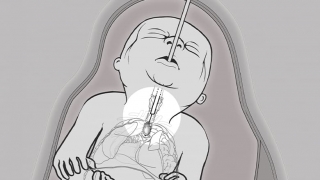Holistic Care for The Whole Family: Congenital Diaphragmatic Hernia
Published on
In Utero InsightsPublished on
In Utero InsightsOur team offers a wide array of treatment options and resources to support families who turn to us for expert care when expecting a baby with congenital diaphragmatic hernia (CDH). They include:
 Fetoscopic endoluminal tracheal occlusion
We offer fetal surgery for congenital diaphragmatic hernia, known as fetoscopic endoluminal tracheal occlusion (FETO). FETO is a fetal surgery procedure that may allow the lungs to grow enough before birth and improve outcomes in babies with severe cases of CDH. Our maternal-fetal medicine physician and pediatric surgeon discuss this treatment option with families during their evaluation to determine if it is appropriate for them.
Fetoscopic endoluminal tracheal occlusion
We offer fetal surgery for congenital diaphragmatic hernia, known as fetoscopic endoluminal tracheal occlusion (FETO). FETO is a fetal surgery procedure that may allow the lungs to grow enough before birth and improve outcomes in babies with severe cases of CDH. Our maternal-fetal medicine physician and pediatric surgeon discuss this treatment option with families during their evaluation to determine if it is appropriate for them.
Our maternal-fetal medicine team follows a rigorous monitoring protocol focused on preventing intrauterine fetal demise and works with referring providers to coordinate care throughout the pregnancy. Routine follow-up appointments take place close to home, with monthly appointments at the Center until later in the pregnancy. For many diagnoses, relocation is necessary for families who live more than an hour away from the Center, especially in cases where there is prenatal intervention. This ensures that the mother is nearby in the event labor occurs or delivery is indicated earlier than expected.
We provide a very wide array of support services for families as they weather the storm and navigate the logistics of a complex and complicated pregnancy. In addition to imaging, follow-up appointments at the Center include checkins with a social worker, a psychologist, a child life specialist to support siblings, a lactation consultant and the neonatologists who will care for the child after birth. Our social workers provide relocation resources, coordinating timing of relocation and housing options based upon a family’s needs.
For some families, the costs of travel, lodging, relocation, a long hospital stay and other life logistics are significant barriers to accessing the Center’s expert care. In such situations, we have a special fund that can help cover expenses insurance will not, such as travel costs, lodging, meals and other expenses related to getting to and staying in Philadelphia during evaluation, treatment and recovery.
Healthcare professionals are invited to sign up for In Utero Insider, an email newsletter from the Center for Fetal Diagnosis and Treatment. Stay up to date on our clinical services, research, educational opportunities and more.